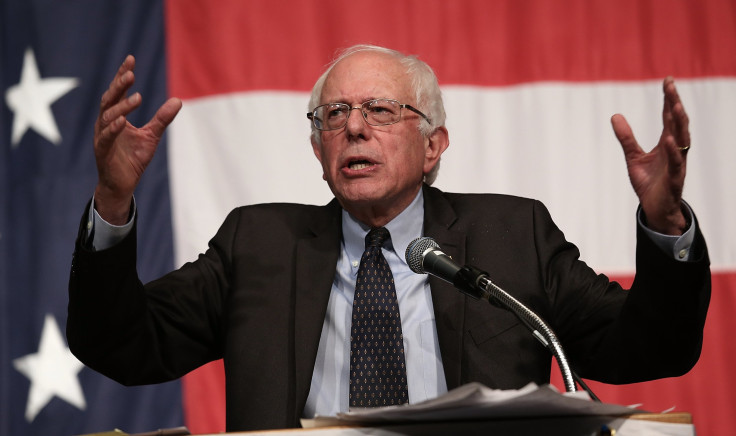
Democratic presidential candidate Sen. Bernie Sanders (I-Vt) filed the Justice is Not For Sale Act of 2015 on Thursday, proposing a massive overhaul to the U.S. prison system and serious tweaking to sentencing guidelines. The long-term goals of the bill are to reduce the overall prison population by decreasing jail sentences and recidivism. The bill proposes ending management of private prisons within 2 to 3 years. In the short term, it hopes to improve upon existing prison conditions, particularly those awaiting immigration proceedings.
“Private prison corporations spend millions [...] lobbying [...] for harsher sentencing laws and immigration policy that serves their bottom line. [We] need to restore confidence in our criminal justice system. Step one is taking the profit out of the punishment,” said Rep. Keith Ellison (D-Minnesota) who sponsored a house version of the bill.
The bill is similar to position papers released by Sanders’ relatively unknown primary rival, former Maryland Gov Martin O’Malley, who promised to phase out private prisons in July.
Sanders bill calls for the end of family detention and to the Immigration and Customs Enforcement 34,000 bed quota mandated by Congress, another idea proposed by O’Malley months ago.
“The so-called ‘bed quota’ is costly and harmful,” Sanders said in a statement. “Allowing the agency to utilize alternatives to detention would save taxpayers over $5 million per day, or around $1.4 billion per year.”
We must end the private prison racket. pic.twitter.com/fcxpCiS5OG
— Bernie Sanders (@SenSanders) September 18, 2015Sander’s bill might not have a chance in Congress. O’Malley’s paper might have been published first. But there’s something powerful about introducing a bill. It allows the candidate to say that they are doing something, not just “calling for” something.
For the Vermont Senator, it’s one of the perks of running for president as a legislator. Unlike former Secretary Clinton or former Gov. O’Malley Sanders has a national state -- the Senate -- where he can file bills.
Progressive groups and news outlets welcomed the bill. The Huffington Post called it “ambitious.” So did Think Progress .
If passed, the bill would have a disproportionate affect on immigration prisons. That’s because around half of all U.S. immigration prisons are privatised. Around one fifth of all federal prisons are private, while local prison privatization runs in the single digits.
Some immigration reform advocates appeared to have dismissed the bill telling Fusion that it is merely “symbolic.”* However, the bill received support from respected immigration groups such as the Dream Action Coalition, Immigrant Legal Resource Center, and Maldef.
As long as it is not branded as pandering, Sanders’ legislation might raise his profile with minority voters, who have at times taken a proverbial back seat in his campaign. The Senator is doing well in early states with overwhelming white majorities (like his home state of Vermont), but he’s having trouble in more diverse states.
Whether the bill is practical or a just a pipe dream, it might inject new life into the prison reform debate. It might also pressure Clinton to flush out proposals on immigration and prison reform .
Clinton recently expanded her immigration reform policy from a few lines lines at a press conference to a few lines on her website. The update occurred around the first day of Hispanic Heritage month, a few days ahead of an op-ed that she authored for Spanish-language news website Univision.
Clinton's op-ed, titled “I am with you” did a lot of name dropping, mentioning journalists Jorge Ramos and Maria Hinojosa and activists like Dolores Huerta. It didn't have much policy. But Clinton argues that it’s Republicans’ plans that pro-immigrant voters should be worried about.
“I find it the height of irony that a party which espouses small government, would want to unleash a massive law enforcement effort,” she said in August “[Including perhaps] literally pull people out of their homes and their work places, round them up, put them in, I don't know, buses, boxcars, in order to take them across our border.”
*Update/correction: multiple groups quoted in the Fusion story contacted us saying that they were not "dismissing" the legislation and, though not supporting it directly, do approve of the bill. For example, here's a followup comment from the Not One More Campaign.
"It's incredible to finally see legislation that would reduce the prison population and end companies from profiting from people's suffering. Like any legislation, it should be paired with advocating for immediate solutions that can be enacted by the current administration and in other ways," wrote Tania Unzueta, organizer for #Not1More, in an email.
© 2025 Latin Times. All rights reserved. Do not reproduce without permission.




